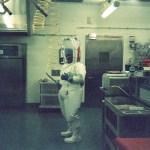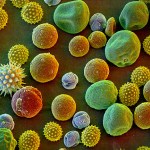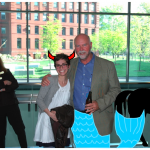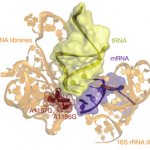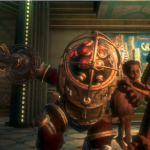biosafety
I'm happy to welcome Dr. Heather Lander to the blogosphere and Twitterverse. She's a virologist who has done work with some of the world's deadliest pathogens in a high-security biosafety level 4 laboratory. This is the type of lab where one must wear "space suits" to work with organisms. You've probably seen in dramatized in various movies and TV shows (such as The Walking Dead). Heather describes what it's really like to work in one--even while pregnant.
Dr. Lander, 9 months pregnant in a BSL4 lab
TS: Can you tell readers a bit about your background and…
In a recent conversation about the safety and ethics of synthetic biology in the wake of the announcement of the synthetic genome, many of the professors I was chatting with commented on how they hoped new synthetic biology technology would lead to bacteria that could eat the oil spilling into the gulf of mexico even as I type this right now. Of course, the "technology" for oil eating bacteria already exists and have already been used for clean up in previous oil spills--many naturally occurring species of bacteria can already break down the hydrocarbons in crude oil. The natural oil eaters…
Biosafety has been on everyone's mind this week after the announcement of the J. Craig Venter Institute's successful transplantation of a synthetic genome. What horrible pathogen will future bioengineers be able to design? What unforeseeable environmental catastrophe will befall us upon the release of genetically engineered bacteria? These are hugely important questions as research in synthetic biology moves forward, being discussed in congressional hearings and as an integral part of every new synthetic biology design.
As the major proposed goal of a great deal of synthetic biology research…
A recent New York Times article tells us that what many people call food allergies are actually simple intolerances, and that allergies are being dangerously overdiagnosed. What is a true food allergy, and what can be done to fix them besides banning peanuts from schools and avoiding foods that make us itchy?
Allergies are caused by an inappropriate immune response to common things in the environment. Usually the offending allergen is a protein that comes from plants or animals like pollen or dander. Instead of the immune system recognizing that these proteins are harmless, it instead…
The reaction to the Venter Institute's synthetic genome transplantation has been decidedly mixed. Is this the beginning of something new and wonderful, the ability to really design organisms from scratch? Is it something more sinister, the beginning of a dark era where techno-corporate (or terrorist) interests can design something that will destroy the environment in catastrophic ways? Is it just a technical advance or a conceptual breakthrough? A philosophical revolution? Is it a Big Deal or big whoop? Synthetic biology has never been just one thing and still has many different goals, with a…
Unlike many of my colleagues, I'm not really interested in the whole "science vs. religion" thing, but I do want to point out the very thoughtful analysis of genetic engineering and synthetic biology by the Church of Scotland's Society, Religion, and Technology Project. On GM food, they write:
The official scientific and economic reports support the view of the 1999 Assembly, that GM is not a simple 'yes or no' issue and must be taken case-by-case, weighing up many different factors. Theologically, SRT has found no convincing reason to say it is a wrong act to transfer genes into a crop from…
My semester in MIT's course on Documenting Science Through Video and New Media has drawn to a close. I've had a wonderful time and learned a lot about how films and science are constructed by different people in different times for different reasons. Most of all I've learned about how challenging it can be to put together an interesting narrative and present a point of view while at the same time ensuring that the science being explained is honest and clear to everyone. I've recently gotten the chance to watch two great recent science documentaries outside of class, Naturally Obsessed and…
An interesting paper in BioEssays last month looks at the potential future of xenobiology, totally orthologous biological systems made out of synthetic nucleotide and amino acid bases, new cells that use XNA instead of DNA. The author, Markus Schmidt, argues that while the design of such systems current poses a difficult technological challenge to researchers in synthetic biology, that xenobiological systems will enable a "genetic firewall" between natural and designed organisms, creating a built-in measure of biosafety.
This is something I've argued for before, in reference to creating new…
The fight over genetically modified foods, whether they're safe, healthy, good for the environment, or just plain "unnatural," has been going on for a long time now. Most people in the scientific community agree that genetic modification in general is a good thing, able to create crops that need less water, less fertilizer, less pesticide, or that contain extra vitamins and nutrients that are otherwise difficult to come by in certain parts of the world. Many would also argue that fighting against such life-saving, often environmentally sustainable modifications is a sign of an ignorant anti-…
Some of the responses to my post about synthetically expanding the genetic code have highlighted some of the weaknesses in my argument about the safety of using a different genetic code. Namely, that "life finds a way", that we can't really ever know for sure what will happen when we release a synthetic organism in the wild, or how natural selection will act on them. The science fiction scenarios where engineered organisms escape, break out of the designed restrictions on their growth and take over in new and terrifying ways are compelling, frightening, and instructive for thinking about…
Almost every living thing shares an identical genetic code, with three nucleic acids in an RNA sequence coding for a single amino acid in the translated protein sequence. While there are 64 three-letter RNA sequences, there are only 20 amino acids and degeneracy in the code allows some amino acids to be coded by multiple codons. Chemists and synthetic biologists in the past few years have been working to expand this genetic code, with unnatural nucleotides that can be incorporated into DNA and RNA sequences and unnatural amino acids that can expand the chemical functionality of proteins.…
BioShock2 came out a couple days ago, the sequel to the wildly successful video game BioShock. BioShock is a first-person-shooter video game set in Rapture, an underwater city overrun by violently insane genetically engineered mutants called "Splicers", creepy zombie-like girls, "Little Sisters", that harvest corpses for "ADAM"--sea slug stem-cells that provide super-human strength, regenerative powers, and the ability to rewrite the human genome with the injection of "plasmids"--and genetically engineered "Big Daddies" that protect them, mentally blank superhumans grafted into enormous…
Synthetic biology is still a new field, and victories are small and incremental. Much of the promise and peril of synthetic biology still lies in the future: genetic devices made to order, computer aided genome design, organisms specially constructed for specific industrial purposes. Will we use this biological technology for good--new more affordable and accessible drugs, better vaccines to emerging diseases, and clean energy--or evil--new deadly pathogens and immortal super soldiers? I think it's safe to say that almost everyone hopes that we'll get all of the good stuff without any of the…
Awful Library Books has a post on books about genetic engineering from the 1970's and 80's, saying that it's time to get rid of them because "Genetic information is dramatically different from what we knew in the 70's and 80's. No mention of Human Genome Project or Dolly, the sheep." If you're looking for information about cutting-edge genetic engineering you're probably better off not looking for a book at all, but while science is inherently focused on the future, a historical perspective is almost always valuable, especially when it comes to genetic engineering and synthetic biology.
The…
